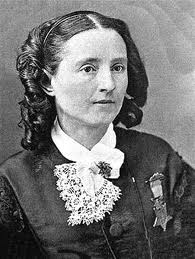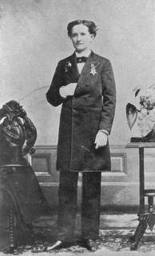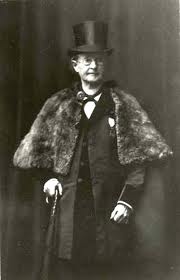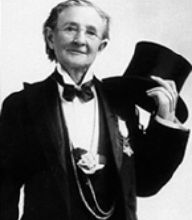 New York Patriot, Mary Edwards Walker, was not only a Feminist Surgeon Hero, but a pioneering abolitionist and prohibitionist, who was awarded the Medal of Honor. Walker, became an early enthusiast for Women’s Rights, and passionately espoused the issue of dress reform. Mary Edwards Walker discarded the unusual restrictive women’s clothing of the day and later in her life she donned full men’s evening dress to lecture on Women’s Rights. Her father, a country doctor, was a free thinking participant in many of the reform movements that thrived in upstate New York in the mid 1800s and his daughter Mary would make him proud, for her work as an outspoken women’s rights activist, for seeking to change the restrictive styles of women’s fashions of her day, and for refusing to be held back by her gender.
New York Patriot, Mary Edwards Walker, was not only a Feminist Surgeon Hero, but a pioneering abolitionist and prohibitionist, who was awarded the Medal of Honor. Walker, became an early enthusiast for Women’s Rights, and passionately espoused the issue of dress reform. Mary Edwards Walker discarded the unusual restrictive women’s clothing of the day and later in her life she donned full men’s evening dress to lecture on Women’s Rights. Her father, a country doctor, was a free thinking participant in many of the reform movements that thrived in upstate New York in the mid 1800s and his daughter Mary would make him proud, for her work as an outspoken women’s rights activist, for seeking to change the restrictive styles of women’s fashions of her day, and for refusing to be held back by her gender.
Born into the abolitionist family of Alvah and Vesta Whitcomb Walker in Oswego, New York, on Nov. 26, 1832, Walker’s future relied heavily on her experiences as a child and the encouragement of her father. He planned for all his children to be educated, even building the town’s first schoolhouse on his land. Also a self-taught country doctor, it would be his collection of medical books that first sparked Walker’s interest in pursuing a medical career.
Walker was the youngest of five daughters and all in the Walker household provided labor for their farm, so their father did not require the girls to wear the women’s garb of the time, but instead, attire better suited to the labors of farming. Her parents believed tight-fitting women’s clothing items like corsets were unhealthy. This notion would follow Walker in her own pursuit of women’s rights and women’s dress reform.
Mary’s father built Oswego’s first schoolhouse on his land and Mary’s mother, Vesta was the teacher. Mary and her siblings attended the school as well as other local children. Later, she would attend the Falley Seminary in Fulton, New York and follow in her mother’s footsteps, teaching school in Minetto, New York in 1852.
Mary Walker challenged convention by attending medical school. She graduated in June of 1855 from Syracuse Medical College, the United States’ first medical school to accept women and men equally. Medical training there consisted of three 13-week semesters, for which she paid $165.
In 1856, Walker married former student, Albert Miller, while wearing a man’s coat and trousers. Keeping her last name, Walker and Miller moved to Rome, New York, where they began a joint medical practice. But it seemed people of the time were not receptive to seeing a woman physician, and their practice stalled. They would eventually divorce.
 When the Civil War began, Mary Walker came to Washington and tried to join the Union Army. Denied a commission as a medical officer, she volunteered anyway, serving as an acting assistant surgeon, the first female surgeon in the US Army. As an unpaid volunteer, she worked in the US Patent Office Hospital in Washington. Later, she worked as a field surgeon near the Union front lines for almost two years, including Fredericksburg and in Chattanooga, after the Battle of Chickamauga.
When the Civil War began, Mary Walker came to Washington and tried to join the Union Army. Denied a commission as a medical officer, she volunteered anyway, serving as an acting assistant surgeon, the first female surgeon in the US Army. As an unpaid volunteer, she worked in the US Patent Office Hospital in Washington. Later, she worked as a field surgeon near the Union front lines for almost two years, including Fredericksburg and in Chattanooga, after the Battle of Chickamauga.
In September 1863, Walker was finally appointed assistant surgeon in the Army of the Cumberland for which she made herself a slightly modified officer’s uniform to wear, in response to the demands of traveling with the soldiers and working in field hospitals. She wore two pistols at all times and after more than two years of volunteer service, she was promoted on the field by General George Thomas to the rank of “Contract Acting Assistant Surgeon (civilian)” in the Army of the Cumberland. She later served as assistant surgeon of the 52nd Ohio Infantry.
 Walker provided medical care for injured civilians on both the Union and Confederate side, repeatedly crossing alone into enemy territory on horseback. On one of her Southbound missions she was arrested as a spy, and held for four months at a Confederate prison in Richmond, Virginia. She was released in a prisoner exchange that allowed some three dozen physicians to return to their respective Armies, and she later said she was delighted to have been part of a “man for man” swap. Mary spent the remainder of the war practicing at a Louisville female prison and an orphan’s asylum in Tennessee.
Walker provided medical care for injured civilians on both the Union and Confederate side, repeatedly crossing alone into enemy territory on horseback. On one of her Southbound missions she was arrested as a spy, and held for four months at a Confederate prison in Richmond, Virginia. She was released in a prisoner exchange that allowed some three dozen physicians to return to their respective Armies, and she later said she was delighted to have been part of a “man for man” swap. Mary spent the remainder of the war practicing at a Louisville female prison and an orphan’s asylum in Tennessee.
On Nov. 11, 1865, President Andrew Johnson, with the recommendation of Major Generals William T. Sherman and George H. Thomas, signed a bill that gave Walker the Medal of Honor for Meritorious Service. The citation recognized her “valuable service to the government, devoting herself with much patriotic zeal to the sick and wounded soldiers, both in the field and hospitals, to the detriment of her own health, and enduring hardships as a prisoner of war.” The citation also stated that “by reason of her not being a commissioned officer in the military service, a brevet or honorary rank cannot, under existing laws, be conferred upon her” so therefore, “in the opinion of the president an honorable recognition of her services and sufferings should be made.”
Walker’s service record reads:
Dr. Mary E. Walker (1832-1919) Rank and organization: Contract Acting Assistant Surgeon (civilian), U. S. Army. Places and dates: Battle of Bull Run, July 21, 1861; Patent Office Hospital, Washington, D.C., October 1861; following Battle of Chickamauga, Chattanooga, Tenn., September 1863; Prisoner of war, Richmond, Va., April 10, 1864-Aug. 12, 1864; Battle of Atlanta, September 1864; entered service at: Louisville, Kentucky.
After the war, Mary Edwards Walker became a writer and lecturer, touring here and abroad on women’s rights, dress reform, health and temperance issues. Tobacco, she said, resulted in paralysis and insanity. Women’s clothing, she said, was immodest and inconvenient. She was elected president of the National Dress Reform Association in 1866. Walker prided herself by being arrested numerous times for wearing full male dress, including wing collar, bow tie, and top hat. She was also something of an inventor, coming up with the idea of using a return postcard for registered mail. She wrote extensively, including a combination biography and commentary called Hit and a second book, Unmasked, or the Science of Immortality.
In 1917, the U.S. Congress changed the criteria for the Congressional Medal of Honor to include “actual combat with an enemy,” and Walker’s medal was revoked. Walker refused to return the medal, and wore it every day until her death.
 For years, friends and family lobbied to have Walker’s medal reinstated and in 1977 President Jimmy Carter signed an order doing just that, citing Walker’s “distinguished gallantry, self-sacrifice, patriotism, dedication and unflinching loyalty to her country, despite the apparent discrimination because of her sex.”
For years, friends and family lobbied to have Walker’s medal reinstated and in 1977 President Jimmy Carter signed an order doing just that, citing Walker’s “distinguished gallantry, self-sacrifice, patriotism, dedication and unflinching loyalty to her country, despite the apparent discrimination because of her sex.”
In 1982, the U.S. Postal Service issued a 20-cent, first-class stamp in commemoration of Dr. Mary Edwards Walker, as a recipient of the Congressional Medal of Honor and the second woman to graduate from a medical school in the United States.
A description of Walker comes from the U.S. Postal Service which reads, “Dr. Mary Walker was a humanitarian devoted to the care and treatment of the sick and wounded during the Civil War, often at the risk of her own life. A patriot dedicated and loyal to her country, she successfully fought against the sex discrimination of her time. Her personal achievements, as much as her vocal support, significantly contributed to the struggle for women’s rights.”
In 1897, Mary Walker stated,
 “I am the original new woman…Why, before Lucy Stone, Mrs. Bloomer, Elizabeth Cady Stanton and Susan B. Anthony were—before they were, I am. In the early ’40’s, when they began their work in dress reform, I was already wearing pants…I have made it possible for the bicycle girl to wear the abbreviated skirt, and I have prepared the way for the girl in knickerbockers.”
“I am the original new woman…Why, before Lucy Stone, Mrs. Bloomer, Elizabeth Cady Stanton and Susan B. Anthony were—before they were, I am. In the early ’40’s, when they began their work in dress reform, I was already wearing pants…I have made it possible for the bicycle girl to wear the abbreviated skirt, and I have prepared the way for the girl in knickerbockers.”
Mary Edwards Walker died on February 21, 1919, of natural causes and was buried in a flag draped coffin, wearing her black suit and tie. She rests in the Rural Cemetery in Oswego, New York.
Doctor Walker was not only a New York Patriot and a Feminist Surgeon Hero, but an inspiration to young women, that following a passion is, often times, more important than restricting the dream.
Bummer


Clara Barton was certainly an impressive woman but amazing that she sucked up all the oxygen that kept Dr. Walker from getting her fair share of attention.
Louis,
Walker was an interesting study. There was more there than met the eye. Little if any personal correspondence. True operatives were sworn to secrecy and little is known of their real motives or deeds. Who knows? Thanks for the read.
Bummer
The harrowing medical journey of a Civil War amputee.
New York Times,
Thanks for sharing. Great Article!
Bummer